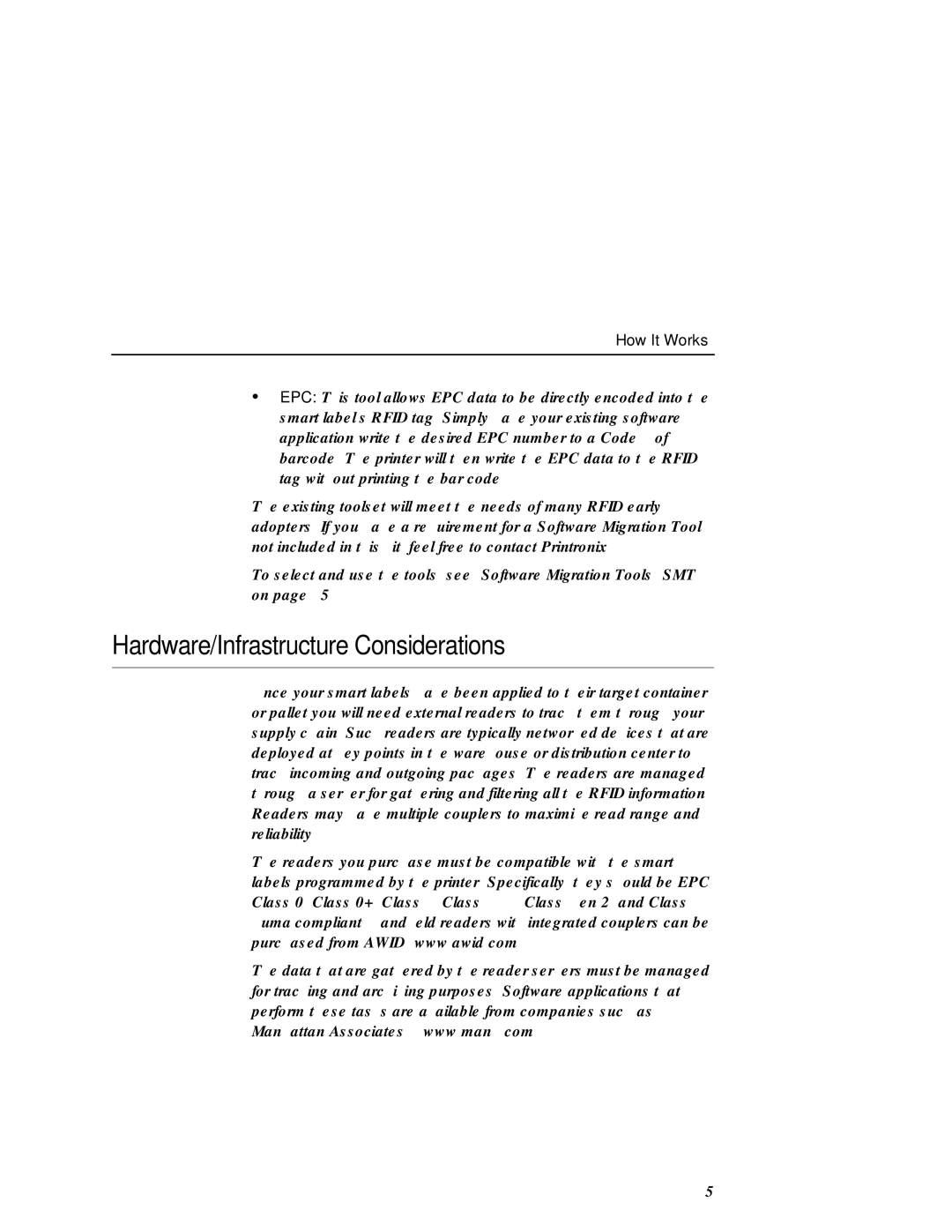Rfid Labeling Reference Manual
Page
Rfid Labeling Reference Manual
Trademark Acknowledgements
Table of Contents
MP2 Rfid
Table of Contents
Table of Contents
Overview
Rfid Smart Label Application Reference Notes
Overview
Factors Affecting Smart Label Performance
What To Expect When Running Your Rfid Application
Factors Affecting Smart Label Performance
Overstruck Smart Labels
General Tag Type
Smart Label Characteristics
What To Expect When Running Your Rfid Application
Supported Tag Types
Smart Label Characteristics
Technology Tag Class
Label Size
How Printronix Makes It Easy
How It Works
Transitioning From UCC/GTIN Applications
How It Works
Hardware/Infrastructure Considerations
Printronix Customer Support Center
Printronix Professional Services
How To Order More Smart Labels
Contact Information
Corporate Offices
Corporate Offices
Useful Industry Web Links
Smart Label Development
Rfid Control Menu
Rfid Control Menu
Cont. from previous
Cust Early Write Custom Run Cal
Rfid Control Menu Items
Rfid Control Menu Items
Rfid Reader
Tag Type
Page
Page
Page
Tag Write Cnt
Error Handling
Max Retry Error
Label Retry
Clear Tag Stat
Failed Tag Cnt
Tag Void Cnt
Tag Read Cnt
Overstrike Style
PreErase Class 0+
Admin User Menu Items
Read Tag
Read Tag&Eject
Custom Write Pwr
Admin User Menu Items
Auto Retry
Custom Tag
Custom Rd Tries
Custom Read Pwr
Custom Tag Len
Custom Tag Class
Custom Start Pos
Custom Min Power
Custom Run Cal
Custom Tag Pos
Non-RFID Warning
Custom Max Power
Requesting An Rfid Report
EPC Mgr Report
LOCKnformat
Rfid PGL Commands
Format RFWTAGLOCKnformatsizemem bank Bit Field+
Stop
Rfid PGL Commands
IDF command in the Execute mode
DF command in the Execute
IDF command in the Execute
Step and startdata parameters using
Default, there is no reset count. The reset count
Repeated before it is incremented. The default repeat
Optional incremental reset count parameter to
Printed before it is reset to the starting value. By
Rfwtag
Example
~CREATESGTIN-64432 RFWTAG64
Stop END ~EXECUTESGTIN-641 ~NORMAL
~DF4*ABCDE
SGTIN-64 ~CREATESGTIN-64432 RFWTAG64
Stop Alpha
Stop END ~EXECUTESGTIN-64
~CREATESGTIN-96432 RFWTAG96
Stop END ~EXECUTESGTIN-64ICNT1500 ~NORMAL
Stop Barcode
Stop END ~EXECUTESGTIN-961 ~NORMAL
~CREATESGTIN216
RFWTAG96EPC
RFWTAGLOCKDF6D96EPC
~CREATESGTIN432
UNLOCKnformat
END ~EXECUTESGTINFCNT3
Format RFRTAGUNLOCKnformatsizemem bank Bit Field+
Stop Rfrtag
Number ranging from 1 to
Indicate dynamic data
Field to store the read
Result. Replace n with a
Stop RFRTAG64
Format
Format VERIFYfieldformatDASCIIheaderD DASCIITrailerD
Verify
ASCIITrailer
ASCIIheader
Example
~CREATEREADONLY432 RFRTAG64
~CREATEVERIFY432NOMOTION RFRTAG64
Stop RFRTAG64 64DF2H
END ~EXECUTEVERIFY1 ~NORMAL
Rfid PGL Commands Example
Write Tag
Format
Lock
Write Tag
Rfwrite
HEX
Position
Read Tag
Format RDIposition,length,format
RDI
Rfid PPI/ZGL Commands
Read Tag
Format RT x, start, length, hex, retries, motion, reserved
Retries
Rfid PPI/ZGL Commands
Comments
Start
Write or Read Rfid Format
Write or Read Rfid Format
Format RFa,b,c,d
Calibrate Rfid Transponder Position
Define EPC Data Structure
Format HRa,b
Enable Rfid Motion
Rfid Setup
Specify Rfid Retries for a Block
Format RZa
Set Rfid Tag Password
Format HVx,y,ASCII
Host Verification
PPI/ZGL EPC Programming Examples
Host Verification
FO100,100A0N,60,60FN1FS //Print tag data in FN1
Rfid PPI/STGL Commands
Escrk 1,a,b,D16,c.c Escrk 1,a,b,D24,c.c Rfid Write
PPI/ZGL EPC Programming Examples
Return Status Port
Return Status Port
Software Migration Tools SMT
Tools List
Tools List
Page
Selecting The Tools
Selecting The Tools
Error Messages
Error Messages
Control Panel Error Messages Explanation Solution
Rfid Unlock CMD
Rfid MAX Retry
Rfid TAG ERR
Rfid TAG Failed
Setup Guide
Troubleshooting
Troubleshooting
Troubleshooting the Rfid Encoder Symptom Solution
New Coupler System
MP2 Rfid
New Coupler System
Adjusting The Coupler Position
Class 0+, Class Zuma, and Class
Bit And 96 Bit EPC Data Formats
Class 1 Gen
Gen
PGL EPC Format Handling Selected Size of Data Based on
Request from Result Comment
Length Program
64 bit Pad 0s on right for 64 bit = 64 bit
Moving From 64 Bit Tags To 96 Bit Tags
When 64 Bit Data Is Sent To a 96 Bit Tag PGL
Moving From 64 Bit Tags To 96 Bit Tags
Example
When 64 Bit Data Is Sent To a 96 Bit Tag ZGL
When 64 Bit Data Is Sent To a 96 Bit Tag ZGL
~NORMAL ~CREATETEST1216 RFWTAG64
END ~EXECUTETEST1 ~NORMAL
Multiple Read/Write Commands On One Label
~NORMAL ~CREATETEST1NOMOTION RFRTAG64
END ~EXECUTETEST1 ~NORMAL ~CREATETEST1 RFWTAG64
Customer Scenario
Verify Command is not Rfid Specific
Verify Command is not Rfid Specific
Splitting the EPC
Splitting the EPC
Simplest Solution
Using The Advanced Rfid Calibration
Tag Profiler
Tag Profiler
Custom Tag Configurator
Using The Advanced Rfid Calibration
Auto Inlay Locater
Page
178424-001

